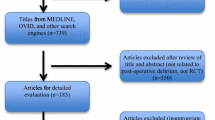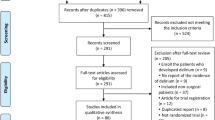Abstract
BACKGROUND AND OBJECTIVES
Despite the significant burden of delirium among hospitalized adults, there is no approved pharmacologic intervention for delirium. This systematic review evaluates the efficacy and safety of pharmacologic interventions targeting either prevention or management of delirium.
DATA SOURCES
We searched Medline, PubMed, the Cochrane Register of Controlled Trials, and the Cumulative Index to Nursing and Allied Health Literature (CINAHL) information systems from January 1966 to October 2008. We included randomized, controlled trials comparing pharmacologic compounds either to each other or placebo. We excluded non-comparison trials, studies with patients aged < 18 years, a history of an Axis I psychiatric disorder, and patients with alcohol-related delirium.
REVIEW METHODS
Three reviewers independently extracted the data for participants, interventions and outcome measures, and critically appraised each study using the JADAD scale.
RESULTS
We identified 13 studies that met our inclusion criteria and evaluated 15 compounds: second-generation antipsychotics, first-generation antipsychotics, cholinergic enhancers, an antiepileptic agent, an inhaled anesthetic, injectable sedatives, and a benzodiazepine. Four trials evaluated delirium treatment and suggested no differences in efficacy or safety among the evaluated treatment methods (first and second generation antipsychotics). Neither cholinesterase inhibitors nor procholinergic drugs were effective in preventing delirium. Multiple studies, however, suggest either shorter severity and duration, or prevention of delirium with the use of haloperidol, risperidone, gabapentin, or a mixture of sedatives in patients undergoing elective or emergent surgical procedures.
CONCLUSION
The existing limited data indicates no superiority for second-generation antipsychotics over haloperidol in managing delirium. Although preliminary results suggest delirium prevention may be accomplished through various mechanisms, further studies are necessary to prove effectiveness.

Similar content being viewed by others
References
Inouye SK, van Dyck CH, Alessi CA, Balkin S, Siegal AP, Horwitz RI. Clarifying confusion: the confusion assessment method. A new method for detection of delirium. Ann Intern Med. 1990; 113: 941–8.
DeFrances CJ, Hall MJ. 2002 National Hospital Discharge Survey. Advance Data from Vital and Health Statistics, 342. Hyattsville, MD: National Center for Health Statistics; 2004.
Boustani M, Buttar A. Delirium in hospitalized older adults. Primary care geriatrics, a case-based approach. Editors: R Ham, P. Sloane, G. Warshaw. 5th Edition 2007, Chapter 15: 210–218.
Trzepacz PT. The neuropathogenesis of delirium. A need to focus our research. Psychosomatics. 1994;35:374–91.
Trzepacz PT. Update on the neuropathogenesis of delirium. Dement Geriatr Cogn Disord. 1999;10(5):330–41.
Trzepacz PT. Is there a final common neural pathway in delirium? Focus on acetylcholine and dopamine. Semin Clin Neuropsychiatry. 2000;5(2):125–31.
van der Mast RC. Delirium: the underlying pathophysiological mechanisms and the need for clinical research. J Psychosomatic Res. 1996;41:109–13.
Flacker JM, Lipsitz LA. Neural mechanisms of delirium: current hypotheses and evolving concepts. Erratum appears in J Gerontol A Biol Sci Med Sci. 1999;54(7):B275.
van der Mast RC, Fekkes D. Serotonin and amino acids: partners in delirium pathophysiology? Clin Neuropsychiatry. 2000;5(2):125–31.
Inouye SK, Bogardus ST Jr, Charpentier PA, et al. A multicomponent intervention to prevent delirium in hospitalized older patients. N Engl J Med. 1999;340:669.
Han L, McCusker J, Cole M, et al. Use of medications with anticholinergic effect predicts clinical severity of delirium symptoms in older medical inpatients. Arch Intern Med. 2001;161(8):1099–105.
Marcantonio ER, Flacker JM, Wright RJ, Resnick NM. Reducing delirium after hip fracture: a randomized trial. J Am Geriatr Soc. 2001;49:516–22.
Seitz DP, Gill SS, van Zyl LT. Antipsychotics in the treatment of delirium: a systematic review. J Clin Psychiatry. 2007;68(1):11–21.
Lacasse H, Perreault MM, Williamson DR. Systematic review of antipsychotics for the treatment of hospital-asociated delirium in medically or surgically ill patients. Ann Pharmacother. 2006;40:1966–73.
Jadad AR, Moore RA, Carroll D, et al. Assessing the quality of reports of randomized clinical trials: is blinding necessary? Control Clin Trials. 1996;17(1):1–12.
Breitbart W, Marotta R, Platt MM, Weisman H, Derevenco M, Grau C, Corbera K, Raymond S, Lund S, Jacobson P. A double-blind trial of haloperidol, chlorpromazine, and lorazepam in the treatment of delirium in hospitalized AIDS patients. Am J Psychiatr. 1996;153(2):231–7.
Han, Chang-Su, Kim, Yong-Ku. A double-blind trial of risperidone and haloperidol for the treatment of delirium. Psychosomatics. 2004;45:297–301.
Lee KU, Won WY, Lee HK, Kweon YS, Lee CT, Pae CU, Bahk WM. Amisulpride versus quetiapine for the treatment of delirium: a randomized, open prospective study. Int Clin Psychopharmacol. 2005;20(6):311–4.
Skrobik YK, Bergeron N, Dumont M, Gottfried SB. Olanzapine vs Haloperidol: Treating delirium in a critical care setting. Intensive Care Med. 2004;30:444–9.
Liptzin B, Laki A, Garb JL, Fingeroth R, Krushell R. Donepezil in the prevention and treatment of post surgical delirium. Am J Geriatr Psychiatry. 2005;13:1100–6.
Sampson EL, Raven PR, Ndhlovu PN, et al. A randomized, double-blind, placebo-controlled trial of donepezil hydrochloride (Aricept) for reducing the incidence of postoperative delirium after elective total hip replacement. Int J Geriatr Psychiatry. 2007;22:343–9.
Kalisvaart KJ, de Jonghe JF, Bogaards MJ, Vreeswijk R, Egberts TC, Burger BJ, Eikelenboom P. Haloperidol prophylaxis for elderly hip-surgery patients at risk for delirium: a randomized placebo-controlled study. J Am Ger Soc. 2005;53(10):1658–66.
Diaz V, Rodriguez J, Barrientos P, Serra M, Salina H, et al. Utilizacion de procolinergicos en la prevencion del delirio postoperatorio del adulto mayor sometido a cirugia de fractura de cadera. Ensayo clinico controlado (Use of citicoline in the prevention of delirium in hip fracture surgery in elderly. A randomized controlled trial. Rev Neurol. 2001;33:716–9.
Pandharipande PP, Pun BT, Herr DL, et al. Effect of sedation with dexmedetomidine vs. lorazepam on acute brain dysfunction in mechanically ventilated patients: the MENDS randomized controlled trial. JAMA. 2007;298(22):2644–53.
Aizawa K-I, Kanai T, Saikawa Y, Takabayashi T, Kawano Y, Miyazawa N, Yamamoto T. A novel approach to the prevention of postoperative delirium in the elderly after gastrointestinal surgery. Surg Today. 2002;32:310–4.
Prakanrattana U, Prapaitrakool S. Efficacy of risperidone for prevention of postoperative delirium in cardiac surgery. Anaesth Intensive Care. 2007;35(5):714–9.
Leung JM, Sands LP, Rico M, Petersen KL, Rowbotham MC, Dahl JB, Ames C, Chou D, Weinstein P. Pilot clinical trial of gabapentin to decrease postoperative delirium in older patients. Neurology. 2006;67(7):1251–3.
Leung JM, Sands LP, Vaurio LE, Wang Y. Nitrous oxide does not change the incidence of postoperative delirium or cognitive decline in elderly surgical patients. Br J Anaesth. 2006;96:754–760.
American Psychiatric Association. Practice guideline for the treatment of patients with delirium. Am J Psychiatry. 1999;156(5 suppl):1–20.
Society of Critical Care Medicine. Clinical practice guidelines for the sustained use of sedatives and analgesics in the critically ill adult. Crit Care Med. 2002;301:119–41.
Acknowledgements
Supported by Grant (K23 AG 26770–01) from the John A. Hartford Foundation, the Atlantic Philanthropies, the Starr Foundation, and the National Institute on Aging.
Conflict(s) of interest
None disclosed.
Author information
Authors and Affiliations
Corresponding author
Rights and permissions
About this article
Cite this article
Campbell, N., Boustani, M.A., Ayub, A. et al. Pharmacological Management of Delirium in Hospitalized Adults – A Systematic Evidence Review. J GEN INTERN MED 24, 848–853 (2009). https://doi.org/10.1007/s11606-009-0996-7
Received:
Revised:
Accepted:
Published:
Issue Date:
DOI: https://doi.org/10.1007/s11606-009-0996-7




